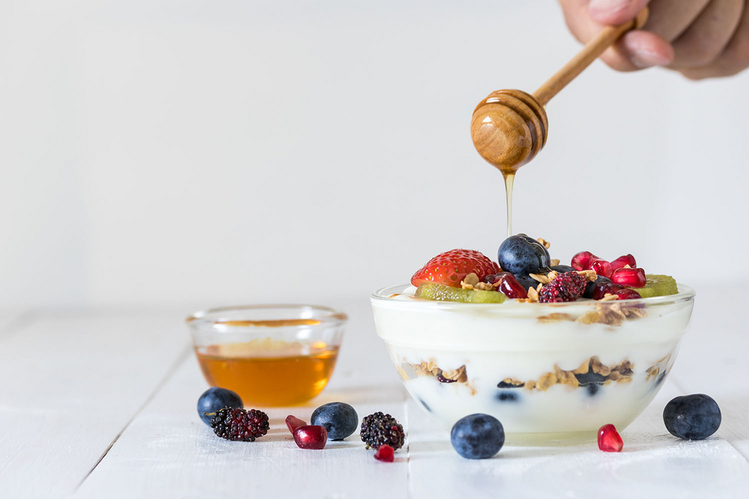Honey added to yogurt supports probiotic cultures for digestive health

URBANA, Ill. — If you enjoy a bowl of plain yogurt in the morning, adding a spoonful of honey is a delicious way to sweeten your favorite breakfast food. It also supports the probiotic cultures in the popular fermented dairy product, according to two new studies from the University of Illinois Urbana-Champaign.
“We were interested in the culinary pairing of yogurt and honey, which is common in the Mediterranean diet, and how it impacts the gastrointestinal microbiome,” said Hannah Holscher, associate professor in the Department of Food Science and Human Nutrition, part of the College of Agricultural, Consumer and Environmental Sciences at Illinois. She is a co-author of the two studies, which are both published in The Journal of Nutrition.
Greek yogurt and other yogurts contain probiotic strains such as Bifidobacterium animalis in addition to conventional yogurt starter cultures. Consumption of certain probiotics can promote digestive health and regular bowel movements, and it can have a positive effect on mood and cognition.
“The enzymes in our mouth, stomach, and intestines help with digestion and facilitate nutrient absorption, but they also reduce the viability of microbes. That’s great when it’s pathogens but not necessarily when it comes to beneficial bacteria,” Holscher said. “We wanted to see if honey could help probiotic bacteria survive in the gut.”
In the first study, the researchers conducted a laboratory experiment where they tested the effect of four different kinds of honey (alfalfa, buckwheat, clover, and orange blossom) on the viability of B. animalis in yogurt through simulated digestion processes. They grew microbes in petri dishes with solutions that mimicked the composition of saliva, stomach acid, intestinal bile, and enzymes.
For the saliva and stomach fluids, there were no differences in B. animalis survival between any of the honey varietals and control treatments of yogurt mixed with sugar or water. However, yogurt with honey – particularly the clover varietal – helped support the survival of probiotics in the intestinal phase of digestion.
Next, the researchers wanted to test their findings in a clinical study. They recruited 66 healthy adults and asked them to consume two different items for two weeks each – yogurt with clover honey and pasteurized, heat-treated yogurt. The participants provided stool samples and information about their bowel movements. They also filled out questionnaires and completed tasks evaluating their mood, cognition, and overall well-being.
“Our findings showed that pairing honey with yogurt supported the survival of the yogurt’s probiotic bacteria in the gut, so the lab study results did translate to real-world application in humans,” Holscher stated.
However, there were no changes in intestinal transit time, bowel movement frequency, or any of the mood and cognition measures. Holscher said this is likely because the participants already were healthy adults with regular bowel movements, so there wasn’t a lot of room for improvement.
The researchers also conducted a smaller follow-up study with 36 participants who consumed a third food item, yogurt with sugar. When the researchers compared the results of all three conditions, the combination of yogurt with honey preserved the most probiotics, but there were no effects on the health measures.
“We found that one tablespoon of honey in a serving of yogurt helps support probiotic survival. However, we have to keep in mind that honey is an added sugar, and most Americans need to be cognizant of the amount of sugar in their diet to maintain a healthy body weight,” she stated. “But adding a little bit of honey to unsweetened yogurt is a nice culinary pairing to incorporate into your menu rotation.”
You can also add toppings to make a yogurt parfait and support gut health and the microbiome by getting more fiber in your diet. For example, you can add berries and seeds, or nuts, and drizzle a bit of honey on top, Holscher suggested
Editor’s notes:
The first study, “Honey Varietals Differentially Impact Bifidobacterium animalis ssp. lactis Survivability in Yogurt through Simulated In Vitro Digestion,” is published in The Journal of Nutrition [DOI:10.1016/j.tjnut.2024.01.010. The research was supported partially by the National Honey Board.
The second study, “Honey Added to Yogurt with Bifidobacterium animalis subsp. lactis DN-173 010/CNCM I-2494 Supports Probiotic Enrichment but Does Not Reduce Intestinal Transit Time in Healthy Adults: A Randomized, Controlled, Crossover Trial,” is published in The Journal of Nutrition [DOI: 10.1016/j.tjnut.2024.05.028]. This work was supported by the National Honey Board and the USDA National Institute of Food and Agriculture, Hatch Project 1009249.
Source:
Hannah Holscher, hholsche@illinois.edu